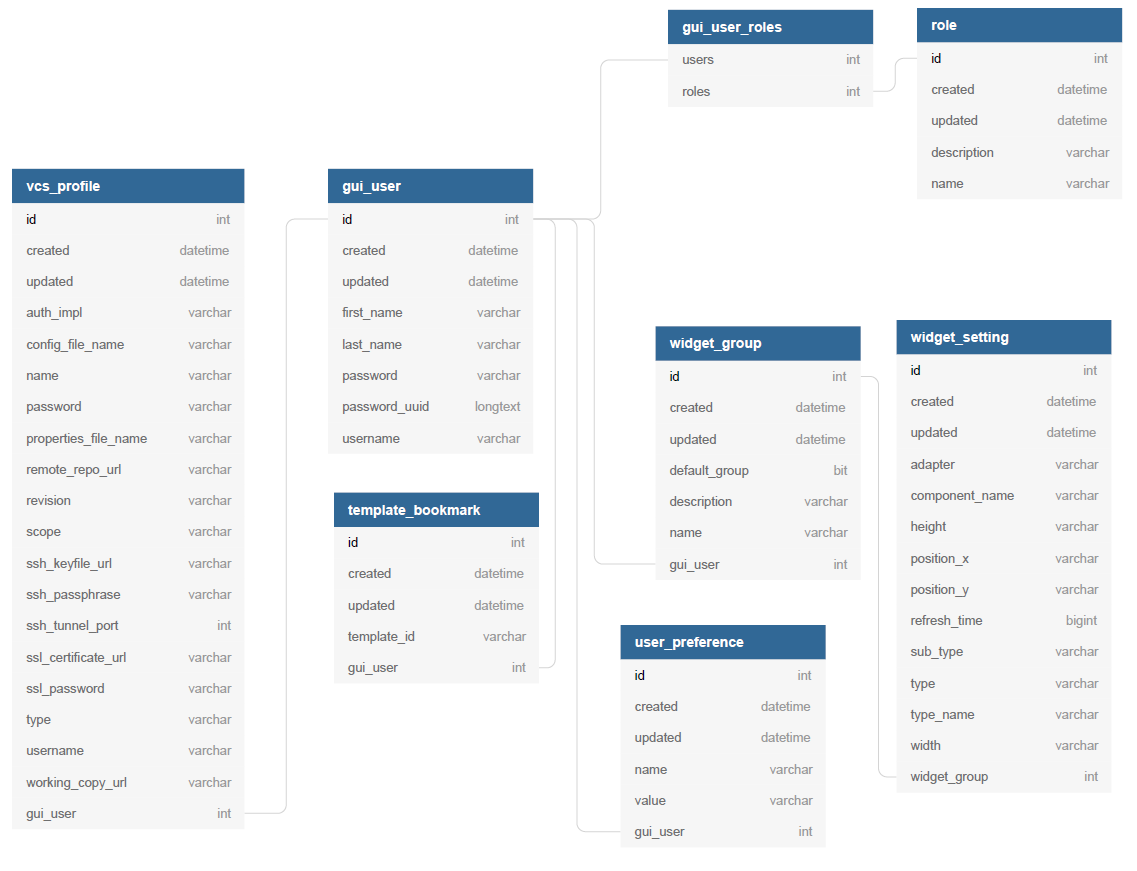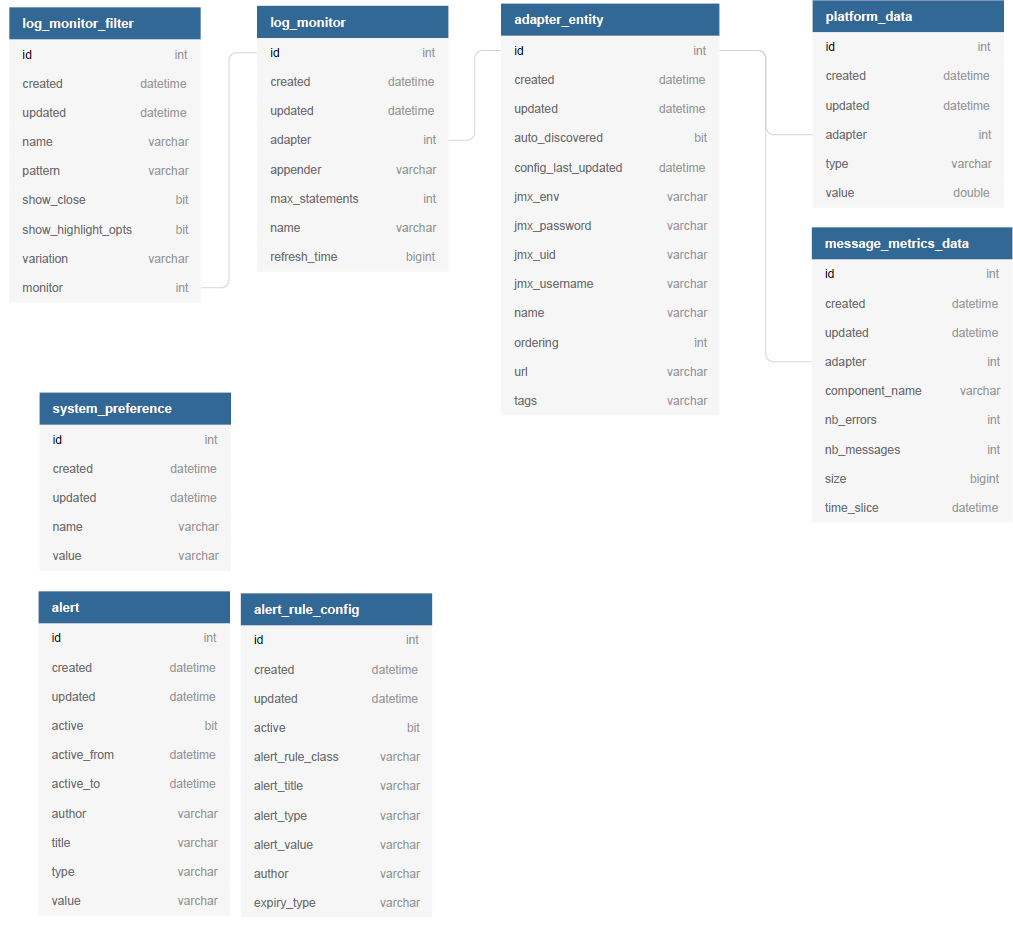The UI has its own Database.
Interlok UI Database Overview
Here is a basic diagram of what the UI Database looks like:


Interlok UI Database Schema
Here is a simple version of our ui database schema: Note, Table “alert_rule_config” is listed here, but should be considered deprecated.
#
# The UI User
#
# "password": Hash of password, PBKDF2 with SHA-1 as the hashing algorithm.
# "password_uuid": not used; is for "forgot password" feature (still in backlog)
#
Table "gui_user" {
"id" int PK
"created" datetime
"updated" datetime
"first_name" varchar
"last_name" varchar
"password" varchar
"password_uuid" longtext
"username" varchar
}
#
# The Users Role
#
# "name": "admin", "monitor", "user" or "viewOnly"
#
Table "role" {
"id" int PK
"created" datetime
"updated" datetime
"description" varchar
"name" varchar
}
#
# Joins together the User and Role
#
Table "gui_user_roles" {
"users" int //"gui_user"."id"
"roles" int //"role"."id"
}
#
# The Adapters registered with the Dashboard
#
# "jmx_uid": unique identifier used in the Adapter configuration XML
# "url": JMX URL used to connect to an Adapter
# "tags": comma-separated values of tags used for filtering e.g. "local-adapter,dev-adapter,pauls,for-mail-processing"
#
Table "adapter_entity" {
"id" int PK
"created" datetime
"updated" datetime
"auto_discovered" bit
"config_last_updated" datetime
"jmx_env" varchar
"jmx_password" varchar
"jmx_uid" varchar
"jmx_username" varchar
"name" varchar
"ordering" int
"url" varchar
"tags" varchar
}
#
# The widgets on the runtime page
#
# "adapter": depending on the widget type, either "adapter_entity"."id" or "adapter_entity"."url"|"adapter_entity"."jmx_uid" e.g. "service:jmx:jmxmp://localhost:5555|my-super-adapter"
# "type": e.g. "details", "message-counts-chart", "platform-memory-heap-chart", etc.
# "component_name": for adapter widgets then the Adapter UID is used e.g. "my-super-adapter", for channel widgets then it should be the channel uid e.g. "WebServer" and for workflow widgets, it would be the workflow uid @ the channel uid, e.g. "DefaultURL@WebServer"
# "position_x": imagine 12 columns, so x should be 00 to 09 (09 only for widgets with width 3)
# "position_y": starts at 00, 2nd row would be 04 (if widgets above had height 4)
# "height"/"width": most widgets are 4&4 by default
#
Table "widget_setting" {
"id" int PK
"created" datetime
"updated" datetime
"adapter" varchar
"component_name" varchar
"height" varchar
"position_x" varchar
"position_y" varchar
"refresh_time" bigint
"sub_type" varchar
"type" varchar
"type_name" varchar
"width" varchar
"widget_group" int //"widget_group"."id"
}
#
# The widget group data
#
Table "widget_group" {
"id" int PK
"created" datetime
"updated" datetime
"default_group" bit
"description" varchar
"name" varchar
"gui_user" int //"gui_user"."id"
}
#
# The users VCS Profile
#
# "type": "Git" or "Subversion"
# "scope": "CONFIG" or "TEMPLATE"
#
Table "vcs_profile" {
"id" int PK
"created" datetime
"updated" datetime
"auth_impl" varchar
"config_file_name" varchar
"name" varchar
"password" varchar
"properties_file_name" varchar
"remote_repo_url" varchar
"revision" varchar
"scope" varchar
"ssh_keyfile_url" varchar
"ssh_passphrase" varchar
"ssh_tunnel_port" int
"ssl_certificate_url" varchar
"ssl_password" varchar
"type" varchar
"username" varchar
"working_copy_url" varchar
"gui_user" int //"gui_user"."id"
}
#
# Data collected for the platform widgets
#
# "type": "widget_setting"."type" e.g. "memoryHeap", "memoryNonHeap", "cpuLoadProcess", "cpuLoadSystem", etc.
#
Table "platform_data" {
"id" int PK
"created" datetime
"updated" datetime
"adapter" int //"adapter_entity"."id"
"type" varchar
"value" double
}
#
# Data collected for the message metrics widgets
#
# "component_name": the workflow uid @ the channel uid e.g. "Send@Invoices", "Receive@Invoices", "Receive@InventoryUpdates", etc.
#
Table "message_metrics_data" {
"id" int PK
"created" datetime
"updated" datetime
"adapter" int //"adapter_entity"."id"
"component_name" varchar
"nb_errors" int
"nb_messages" int
"size" bigint
"time_slice" datetime
}
#
# The alerts data
#
# "active_from": currently not used
# "active_to": currently not used
# "author": currently not used
# "type": "INFORMATION", "WARNING" or "IMPORTANT"
#
Table "alert" {
"id" int PK
"created" datetime
"updated" datetime
"active" bit
"active_from" datetime
"active_to" datetime
"author" varchar
"title" varchar
"type" varchar
"value" varchar
}
#
# The System Preferences
#
# "name": "adapterGuiConfigProjecStoreUrl", "adapterGuiConfigTemplatesUrl", "adapterGuiIdGenerator" or "adapterGuiVcsReposUrl"
# "value": IF "name"=="adapterGuiIdGenerator" THEN "classNameAndRandomIdGenerator", "guidGenerator" or "randomNameGenerator" ELSE file location
#
Table "system_preference" {
"id" int PK
"created" datetime
"updated" datetime
"name" varchar
"value" varchar
}
#
# deprecated! (was going to be used to create rules based alerts)
#
Table "alert_rule_config" {
"id" int PK
"created" datetime
"updated" datetime
"active" bit
"alert_rule_class" varchar
"alert_title" varchar
"alert_type" varchar
"alert_value" varchar
"author" varchar
"expiry_type" varchar
}
#
# Data for the log monitor page
#
Table "log_monitor" {
"id" int PK
"created" datetime
"updated" datetime
"adapter" int //"adapter_entity"."id"
"appender" varchar
"max_statements" int
"name" varchar
"refresh_time" bigint
}
#
# The filters for the log monitors
#
Table "log_monitor_filter" {
"id" int PK
"created" datetime
"updated" datetime
"name" varchar
"pattern" varchar
"show_close" bit
"show_highlight_opts" bit
"variation" varchar
"monitor" int //"log_monitor"."id"
}
#
# The bookmark data for the Config Page Components sidebar panel
#
# "template_id": examples: "classpath/channel", "classpath/standard-workflow", "file-system/Soap-Web-Service"
#
Table "template_bookmark" {
"id" int PK
"created" datetime
"updated" datetime
"template_id" varchar
"gui_user" int //"gui_user"."id"
}
#
# The user preference data
#
# "name": "actionButtonSize", "adapterManagementTimeout", "alwaysLoadActive", "alwaysShowActionButtons", "autoOpenSettingsOnAdd", "componentContainerAutoCollaspe", "dashboardTableMode", "deleteFileOnIgnoreFailedMsg", "disableRemoveConfirmDialog", "displayNameInComponentTitle", "displayWelcome", "editorVimMode", "enableTechnicalPreview", "hideWidgetChartLastIndex", "prettifyNames", "reverseOrderOfLoggingMonitor"
# "value": IF "name"=="actionButtonSize" THEN "small", "normal" or "large" ELSE IF "name"=="adapterManagementTimeout" THEN n ELSE "true" or "false"
#
Table "user_preference" {
"id" int PK
"created" datetime
"updated" datetime
"name" varchar
"value" varchar
"gui_user" int //"gui_user"."id"
}

